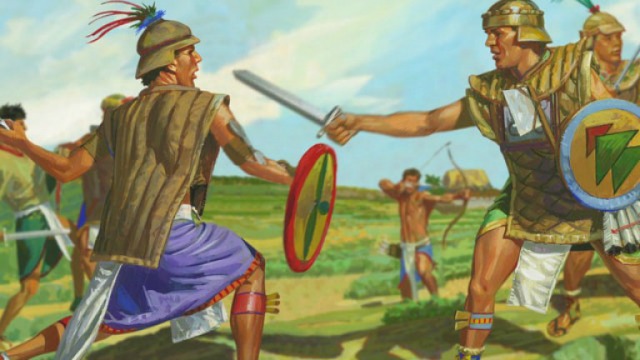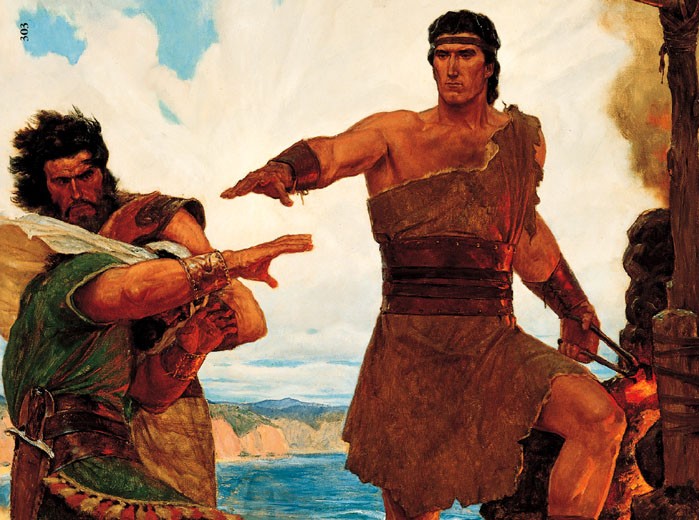Question
Gramps,
Why was it justifiable in Alma 51 for the freemen to put to death the kingmen? Unlike the story of Nephi They don’t seem to have received a commandment from the Lord to do so. If it was not justifiable why doesn’t it say so?
Paige
Answer
Paige,
As we contemplate the comparison between Nephi’s experience with Laban, and the Freemen with the Kingmen there are a few aspects we have to consider: 1) Nephi was alone who was following the will of the Lord to obtain the plates, 2) the current climate of war, and 3) government and the voice of the people. Let’s begin with the last item considered – the government and the voice of the people.
At this time according to scripture we read the following from Captain Moroni,
“And it came to pass that he sent a petition, with the voice of the people, unto the governor of the land, desiring that he should read it, and give him (Moroni) power to compel those dissenters to defend their country or to put them to death.
For it was his first care to put an end to such contentions and dissensions among the people; for behold, this had been hitherto a cause of all their destruction. And it came to pass that it was granted according to the voice of the people.
And it came to pass that Moroni commanded that his army should go against those king-men, to pull down their pride and their nobility and level them with the earth, or they should take up arms and support the cause of liberty.
And it came to pass that the armies did march forth against them; and they did pull down their pride and their nobility, insomuch that as they did lift their weapons of war to fight against the men of Moroni they were hewn down and leveled to the earth.” (Alma 51:15-18)
In this scenario we see Captain Moroni petitioning the governing body (which was done by the consent of the people) to give him power to bring down the pride of the Kingmen. That these Kingmen have the choice to fight with the Nephites or to face the sword. In our own government, we have policies and laws in place that authorize the taking of a life. One of these policies is “treason” especially during times of war. This is accepted by the government and by the voice of the people, as treason (in times of war) could cause the loss of many lives if not stopped and put down immediately. We see here, a similar circumstance, with the Kingmen. These persons rose up against the government during a time of war. They would not lift their arms in support of those who were defending them from the Lamanites. They were actually preventing it, thus, as with any general, Moroni takes the fight to those who are in treason, and provides them a choice: support or die. This is 100% justifiable.
Now, let’s review the second item — climate of war — that the Nephites found themselves within. In this case, we can think for ourselves and recognize if the United States were at war protecting our homeland and one of our state’s governors decided to befriend the enemy and to support (communicate) with the enemy how do you think our US generals would respond to these decisions. My thoughts, the course would be the same as Moroni. The generals would reach out to the United States president. They would look to the voice of the people. And if the voice of the people and the US president were in agreement then we would go to arms against the state that is now making treasonous decisions.
Moroni was a man of sound judgement who did not like bloodshed, but would raise the sword in the defense of his people. A chapter I love with Moroni is when they have defeated the Lamanites and instead of killing all of them (as he could have easily done so), he provided the option for the Lamanites to take an oath. The Kingmen were given a similar option. You can either withdraw from your pride that is preventing you from defending the Nephites and which was the cause of many souls lost because Moroni did not have enough support from the treasonous Kingmen, or the Kingmen would face the sword and die. Moroni’s heart and mind was always for the love and defense of his people the Nephites.
We also know from the Book of Mormon, that when dissenters removed themselves from the Nephites they did often stir up the Lamanites to fight against the Nephites. Moroni saw this also, and knew that if he let them go, during a time of war, they may become their enemy in this war and have to fight them anyway. Thus, it is better to put down the fight now (when they are in a position of power), than at a time when more lives of the Nephites would be lost due to these traitors.
Nephi’s experience is all together in totality different. Nephi was alone following the commandments given by God to his father Lehi. They had tried two other times and were nearly killed for doing the will of the Lord. Nephi did not have a temporal governing body to reach out to as did Moroni, nor was this during a time of war. Nephi though went and did as the Lord commanded (who is the supreme governing authority), and faced a scenario that he himself was not comfortable with but did it anyway knowing the Lord had delivered Laban into his hands.
Gramps







